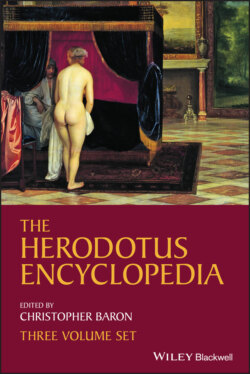Читать книгу The Herodotus Encyclopedia - Группа авторов - Страница 876
ATYS ( Ἄτυς, ὁ) son of Croesus
ОглавлениеANTHONY ELLIS
University of Bern
Atys, son of the Lydian king CROESUS, is doomed from his first mention in the Histories, where a dream prophesies his DEATH. This dream, the narrator comments, was presumably “nemesis from god” taking Croesus because he thought himself “the most happy/blessed (ὀλβιώτατος) of all men” (1.34). Croesus vainly attempts to avert this dream‐vision, which reveals that Atys will die at an IRON spear‐point, by (among other things) keeping his son away from his usual military campaigns (compare the ultimately futile responses to prophetic DREAMS by ASTYAGES and CYRUS (II): 1.107–8, 209.1). When a request comes for Atys to drive out a dangerous boar, Croesus refuses but Atys overhears. In the ensuing argument Atys persuades Croesus that a boar, bereft of iron weaponry, presents no threat (for the sophistic overtones of Atys’ rationalistic but ultimately flawed arguments, see Fornara 1990, 35–36) and expresses his SHAME at being kept from his usual manly pursuits. Croesus reluctantly dispatches Atys and appoints the ill‐fated ADRASTUS SON OF GORDIAS as his guard. But Adrastus’ misthrown spear kills Atys during the hunt, and the PROPHECY thus comes to fulfillment through Croesus’ own attempt to evade it (1.36–43). Atys, like Adrastus, seems a wholly blameless character, and the suffering and death of both is purely collateral damage (on ancestral and communal guilt in Herodotus, see Gagné 2013, 275–343). The unlucky PYTHIUS of 7.27.1 may be the son of this same Atys (if so, presumably named for Croesus’ relationship with the Delphic ORACLE).
The name Ἄτυς, like Ἄδρηστος/Adrastus, has an ominous ring in Greek (ἄτη means “ruin,” “misfortune,” or “disastrous delusion”), but it is well‐attested in LYDIA and PHRYGIA (van Bremen 2010, 448; cf. Hdt. 1.7.3, 1.26, 7.27.1) and thus fits the Anatolian and specifically Lydian setting. Similarities with one version of the myth of Attis, lover of the Phrygian goddess CYBELE, who was also killed by a boar, may indicate a link between the two stories—alternatively it may be nothing more than the coincidence of a common Anatolian name and the folk motif of porcine demise (so Roller 1999, 244–45).
SEE ALSO: Atys father of Pythius; Atys son of Manes; Disaster; Fate; Happiness; Hunting; Mysia; Pigs
